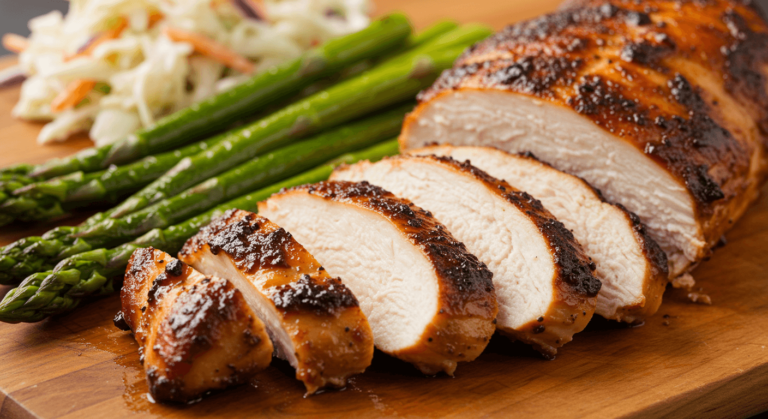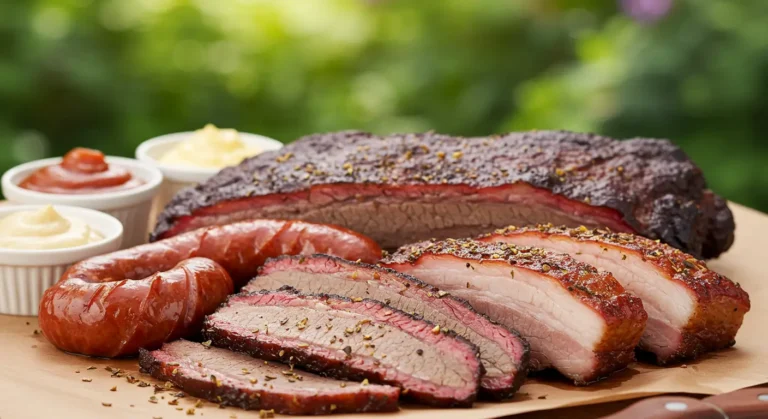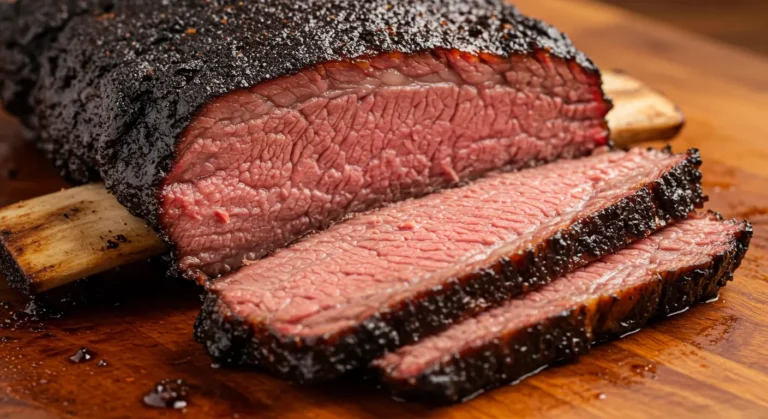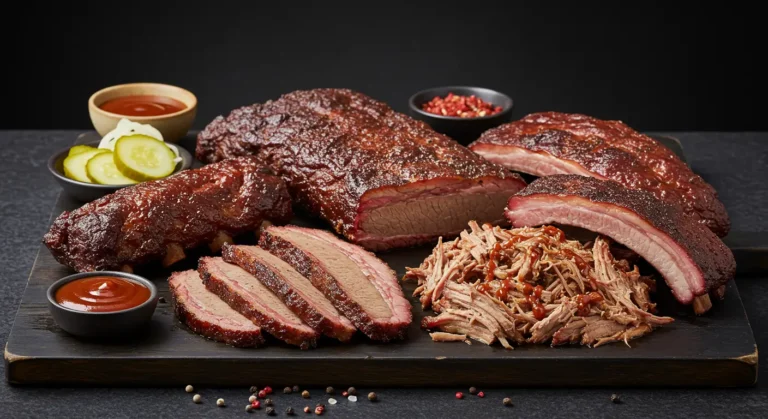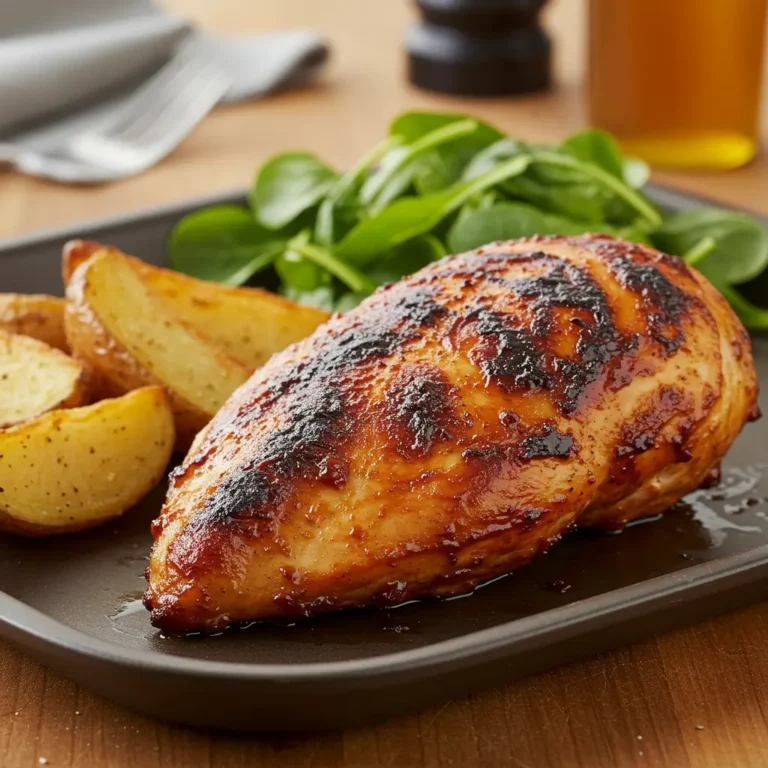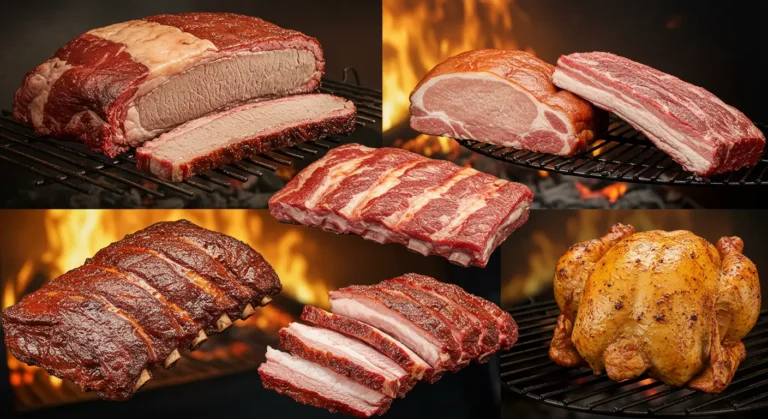The Ultimate Smoked Fish Brine Recipe for Rich Flavor
Making the perfect smoked fish brine recipe turns simple seafood into a gourmet dish. Both professional chefs and home cooks know brining is key. It makes fish tender, flavorful, and keeps it moist.
Smoking fish needs skill and the right recipe. Whether it’s salmon, trout, or halibut, the right brine makes a big difference. Seasoned pitmasters use brining to add deep flavor and keep the fish moist during smoking.
Key Takeaways
- Brining enhances fish flavor and moisture
- Proper technique prevents dry, tough seafood
- Different fish require unique brining approaches
- Salt and sugar play critical roles in brine composition
- Smoking transforms brined fish into a gourmet treat
Understanding the Art of Fish Brining for Smoking
Crafting the perfect smoked recipes starts with fish brining. This technique turns ordinary fish into a masterpiece. It prepares the fish for the smoker with precision.
The Science Behind Brining Process
Brining is more than just soaking fish in salt water. It’s a complex process where osmosis works its magic. Salt molecules enter the fish’s proteins, leading to a chemical reaction.
- Breaks down muscle proteins
- Increases moisture retention
- Prepares the fish for optimal smoke absorption
Benefits of Brining Before Smoking
Professional smokers know brining is key for great flavor and texture. It brings amazing benefits to your smoked recipes:
| Benefit | Impact on Fish |
|---|---|
| Moisture Preservation | Prevents drying during smoking |
| Flavor Enhancement | Allows deeper seasoning penetration |
| Texture Improvement | Creates tender, smooth fish meat |
How Brining Enhances Flavor Absorption
The smoker enhances brined fish by creating a flavor pathway. Salt helps smoke penetrate deeper and more evenly. This results in a rich, complex taste that boosts your dish.
*”Brining is the secret weapon of professional smokers”* – Culinary Experts
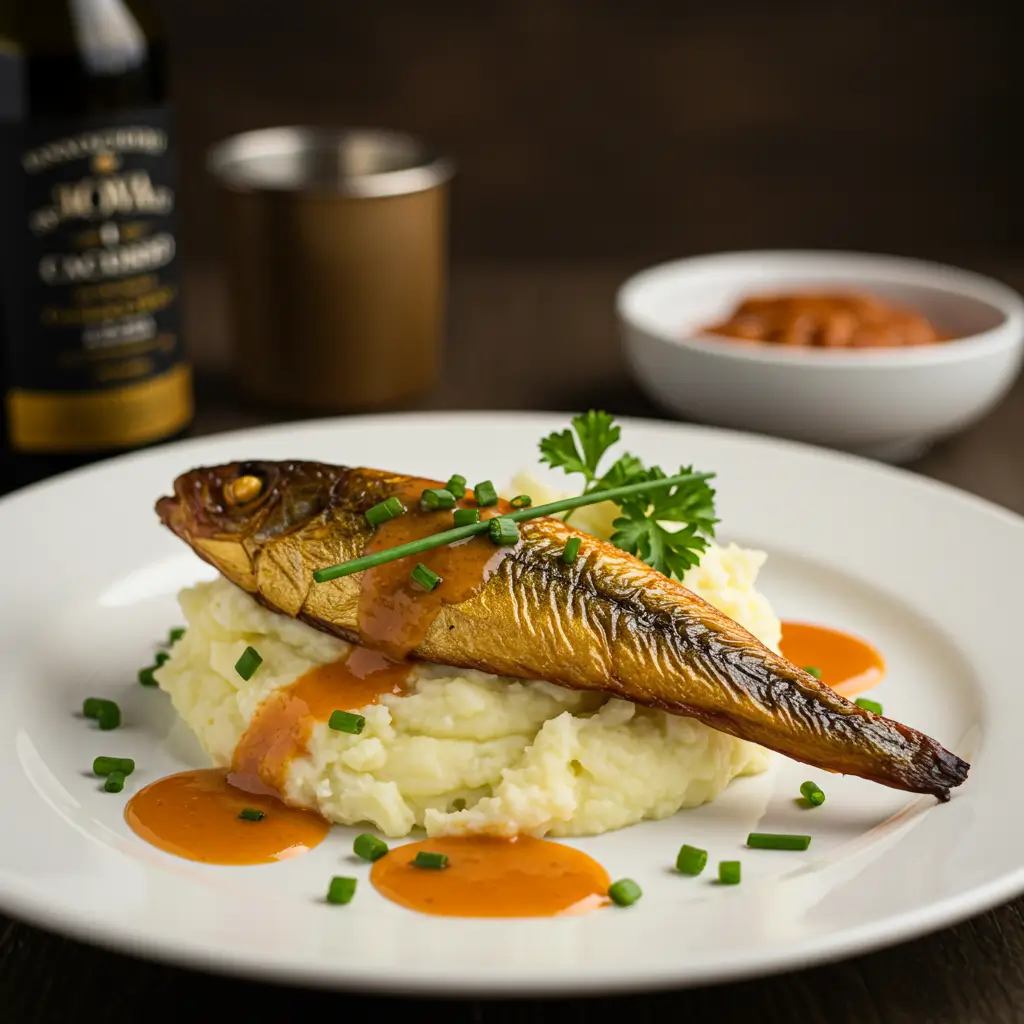
Essential Ingredients for Perfect Smoked Fish Brine Recipe
To make the best smoked fish brine, you need the right ingredients. These ingredients turn regular fish into a dish to remember. The mix of salt, sugar, and spices makes your smoked fish truly special.
Salt is key in any smoked fish brine. Use kosher salt or sea salt for their clean taste and balanced minerals. Quality is more important than how much you use when picking your main seasoning.
- Kosher salt: Primary brine base
- Brown sugar: Balances saltiness
- Fresh herbs: Rosemary, thyme, dill
- Aromatics: Garlic, peppercorns
- Liquid ingredients: Water, white wine
The secret to a great smoked fish brine is finding the right mix of flavors. Brown sugar adds a touch of sweetness to balance the salt. Fresh herbs and spices add depth and complexity to the dish.
| Ingredient | Purpose | Recommended Quantity |
|---|---|---|
| Kosher Salt | Primary seasoning | 1/2 cup per quart of water |
| Brown Sugar | Flavor balance | 1/4 cup per quart of water |
| Fresh Dill | Aromatic enhancement | 2-3 sprigs |
| Garlic | Depth of flavor | 2-3 crushed cloves |
“The secret to an exceptional smoked fish brine is understanding how each ingredient interacts and contributes to the final flavor profile.” – Professional Smokemaster
Try different mixes to find your own unique smoked fish brine recipe. Each ingredient is important for a memorable taste experience.
Best Types of Fish for Smoking and Brining
Choosing the right fish is key to making tasty smoked dishes. Not all fish are good for smoking. Knowing which ones are best can make a big difference in your dish.
When picking the perfect fish, think about a few important things. These things affect how the fish smokes and tastes.
Cold-Water Fish Selections
Cold-water fish are great for smoking because they have a lot of fat and taste rich. Here are some top picks:
- Salmon – The top choice for smoked dishes
- Trout – Has a delicate texture and soaks up smoke well
- Cod – Has a mild taste that smokes well
- Mackerel – Has a strong flavor that’s perfect for intense smoking
Warm-Water Fish Options
Warm-water fish can also be great in smoker recipes if done right:
- Mahi-mahi – Has a firm texture that smokes well
- Snapper – A delicate white fish with great flavor
- Grouper – Thick cuts are perfect for smoking
Thickness and Cut Considerations
The thickness of your fish affects how long it smokes and how well it absorbs brine. Thicker fish need longer to brine and smoke to get the right flavor and safety.
Pro tip: Go for fish cuts between 1-2 inches thick for the best smoking results. Fish that’s too thin might dry out. Fish that’s too thick might not smoke evenly.
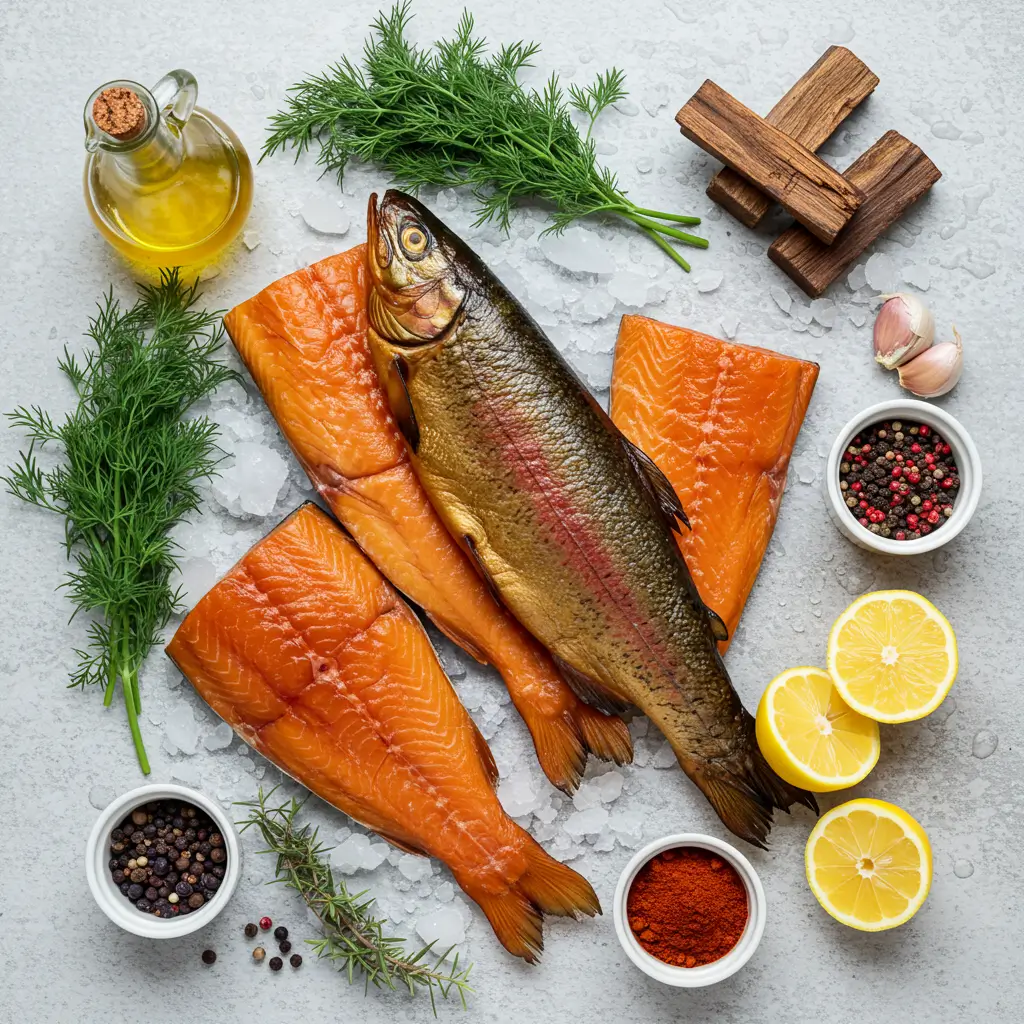
Step-by-Step Guide to Creating the Brine Solution
Making the perfect smoked fish brine recipe needs precision and care. The brine solution makes the fish flavorful and moist. It’s the key to turning ordinary fish into a culinary masterpiece.
Here are the essential ingredients for your smoked fish brine recipe:
- Kosher salt
- Cold water
- Brown sugar
- Seasonings like black pepper or garlic powder
Follow these steps to prepare your brine solution:
- Choose a non-reactive container big enough to hold your fish
- Mix salt and water at a 1 cup salt per gallon ratio
- Stir until all salt is dissolved
- Add brown sugar or herbs for extra flavor
Temperature is key in your smoked fish brine recipe. Use cold water and keep the fish in the fridge. This prevents bacterial growth. The best brining temperature is between 34-40°F.
| Fish Type | Recommended Brine Time | Salt Concentration |
|---|---|---|
| Salmon | 6-8 hours | 10% salt solution |
| Trout | 4-6 hours | 8% salt solution |
| Halibut | 4-5 hours | 9% salt solution |
Pro tip: Always use food-grade containers and follow proper sanitation. This ensures your smoked fish brine recipe is safe and delicious.
Proper Brining Techniques and Timing
Mastering brining is key to making tasty smoked fish. Brining turns regular fish into a flavorful treat. It’s all about the right temperature, timing, and technique.
Brining well can make your smoked fish amazing. It boosts flavor, keeps food safe, and improves texture.
Temperature Control During Brining
Keeping the right temperature is vital. Fish must brine in a cold place to avoid bacteria. The best brining temperature is between 34°F and 40°F. This keeps the fish cold and lets salt and seasonings soak in.
- Use a calibrated refrigerator thermometer
- Store brining fish in a non-reactive container
- Keep fish fully submerged in brine
Duration Guidelines for Different Fish Types
| Fish Type | Thickness | Brining Time |
|---|---|---|
| Salmon | 1 inch | 4-6 hours |
| Trout | 0.5 inch | 2-4 hours |
| Halibut | 1.5 inches | 6-8 hours |
Signs of Properly Brined Fish
Knowing when fish is brined right takes time. Look for these key indicators:
- Slightly firm texture
- Glossy surface appearance
- Subtle salt flavor without being overpowering
- Uniform color throughout the fish
“Brining is an art form that transforms ordinary fish into an extraordinary culinary experience.” – Professional Smoker Chef
Preparing Your Smoker for Optimal Results
Choosing the right smoker is key to making tasty smoked fish. Each smoker type has its own benefits for cooking. Electric, charcoal, and wood-fired smokers need different setups for the best results.
- Clean the smoker well to get rid of old flavors
- Check that everything works right
- Make sure there’s good air flow
- Adjust the temperature settings
Getting your smoker to work right is all about keeping the temperature steady. This is very important for smoking fish. Each smoker needs a special way to keep the temperature just right.
| Smoker Type | Preheating Time | Temperature Range |
|---|---|---|
| Electric Smoker | 15-20 minutes | 225-250°F |
| Charcoal Smoker | 30-45 minutes | 200-225°F |
| Wood-Fired Smoker | 45-60 minutes | 180-225°F |
Experts say to watch the humidity and keep the air moving. If you prepare your smoker right, your fish will soak up all the flavors. It will also get the right texture for your recipes.
“A well-prepared smoker is the secret to exceptional smoked fish.” – Professional Pit Master
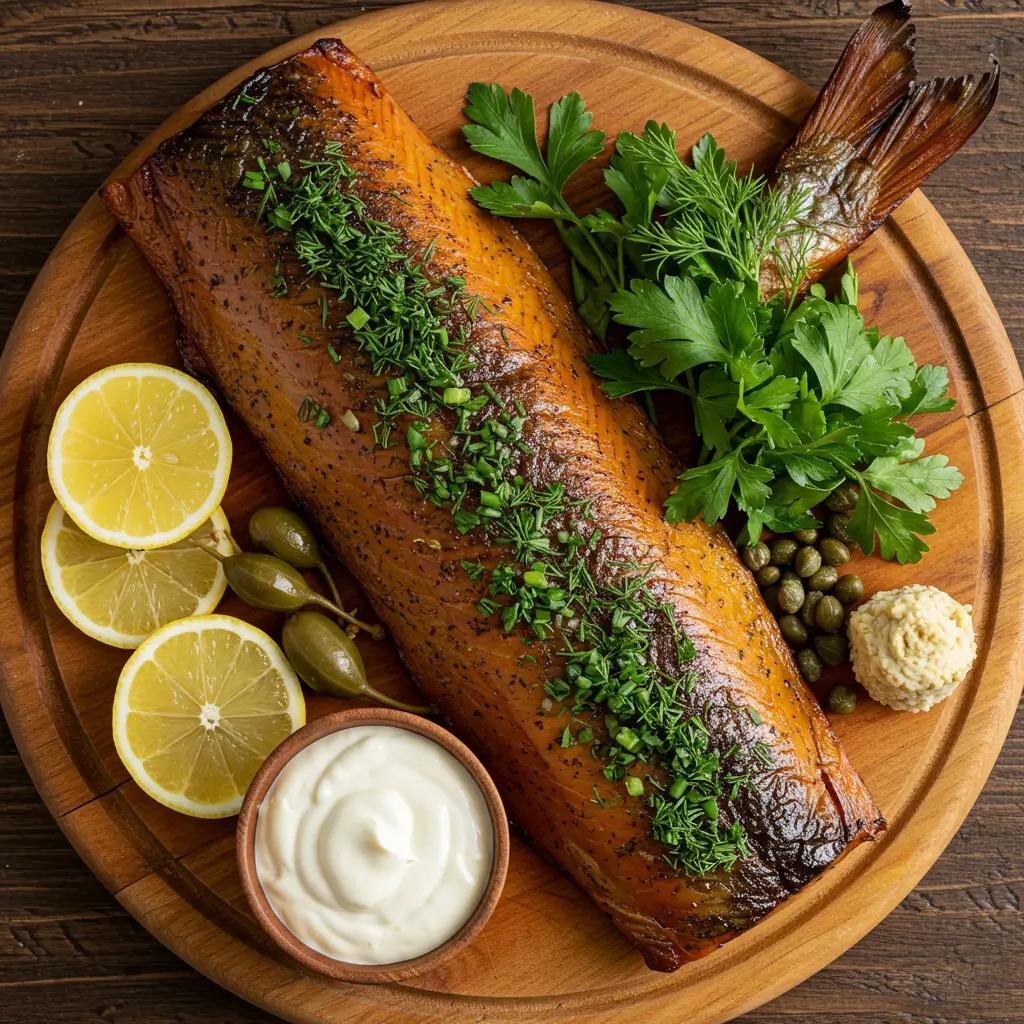
Wood Selection for Enhanced Smoking Flavor
Choosing the right wood is key to making the best smoked fish. Different woods can turn your smoked fish into something amazing. They add unique flavors that go well with fish.
Understanding how wood types work with fish is important. Each wood gives a special taste to your dish.
Best Wood Pairings for Different Fish Types
- Alder Wood: Ideal for lighter fish like salmon, providing a subtle and sweet flavor
- Apple Wood: Perfect for milder fish, with a slightly fruity and delicate smoke
- Hickory Wood: Best for robust fish with stronger flavors, delivering a rich and bold taste
- Cherry Wood: Great for adding a mild, sweet smoky essence to most fish varieties
Smoke Intensity Control
It’s important to control how intense the smoke is. Too much smoke can hide the fish’s flavor. Too little might make it taste bland.
| Wood Type | Smoke Intensity | Best Fish Pairing |
|---|---|---|
| Alder | Light | Salmon, Trout |
| Apple | Mild | Whitefish, Tilapia |
| Hickory | Strong | Mackerel, Tuna |
| Cherry | Medium | Most Fish Types |
Experts say to start with a little wood and add more as needed. This helps find the right balance for your fish and taste.
Temperature Control and Smoking Time Guidelines
Mastering temperature control is key for perfect smoked fish. The right temperature keeps fish moist, flavorful, and safe to eat. Different fish types need different temperatures for the best results.
For smoked recipes, aim for a temperature between 175°F and 225°F. Going lower can make fish undercooked. Going higher can dry out the fish.
- Thin fish fillets: 175-190°F for 1-2 hours
- Medium-thick fish: 190-205°F for 2-3 hours
- Thick fish cuts: 205-225°F for 3-4 hours
Several factors affect smoking time:
- Fish thickness
- Initial meat temperature
- Smoker consistency
- Desired doneness
| Fish Type | Ideal Temp (°F) | Approximate Smoking Time |
|---|---|---|
| Salmon | 190-200 | 2-3 hours |
| Trout | 180-190 | 1-2 hours |
| Halibut | 200-225 | 3-4 hours |
Always check fish temperature with a meat thermometer. Fish is ready when it reaches 145°F at its thickest part. This ensures it’s safe and tastes great.
Troubleshooting Common Brining and Smoking Issues
Making the perfect smoked fish brine recipe needs skill and practice. Even seasoned smokers face problems that can affect the taste. Knowing common issues helps make sure your smoked fish always tastes great.
Preventing Over-Salting
Salt is key in a smoked fish brine recipe. Too much salt can spoil the fish’s flavor. To avoid over-salting:
- Use precise measuring tools
- Follow recommended salt-to-water ratios
- Rinse fish thoroughly after brining
Addressing Texture Problems
Texture is vital for a great smoked fish experience. Different problems need different fixes:
| Texture Problem | Potential Cause | Solution |
|---|---|---|
| Dry Fish | Overcooked in smoker | Reduce smoking time, monitor temperature |
| Mushy Texture | Extended brining time | Reduce brining duration |
| Tough Exterior | High smoking temperature | Lower smoker temperature |
Fixing Flavor Imbalances
A balanced smoked fish brine recipe needs careful ingredient choice. When flavors seem wrong:
- Adjust salt levels gradually
- Experiment with different wood chips
- Use fresh, high-quality ingredients
“Perfect smoking is an art of patience and precision” – Culinary Experts
Conclusion
Making the best smoked fish starts with knowing how to brine. It takes patience, practice, and a desire to try new things. Your brine recipe is key to turning regular fish into a dish to remember.
Every time you smoke fish, you get a chance to get better. Choosing the right fish and wood chips is important. It’s an art that gets better with time, and trying new things helps you find your taste.
Both pros and beginners can make great smoked fish by following some basic rules. Knowing how to brine, keeping the temperature right, and using good ingredients are essential. This guide gives you a good start to making fish that everyone will love.
Getting better takes time and effort. Start with simple recipes and learn from each try. Whether it’s salmon, trout, or another fish, the basics of brining and smoking stay the same. Your journey to making the best smoked fish is just starting.
FAQ
Have You Tried This Recipes!
There are no reviews yet. Be the first one to write one.

